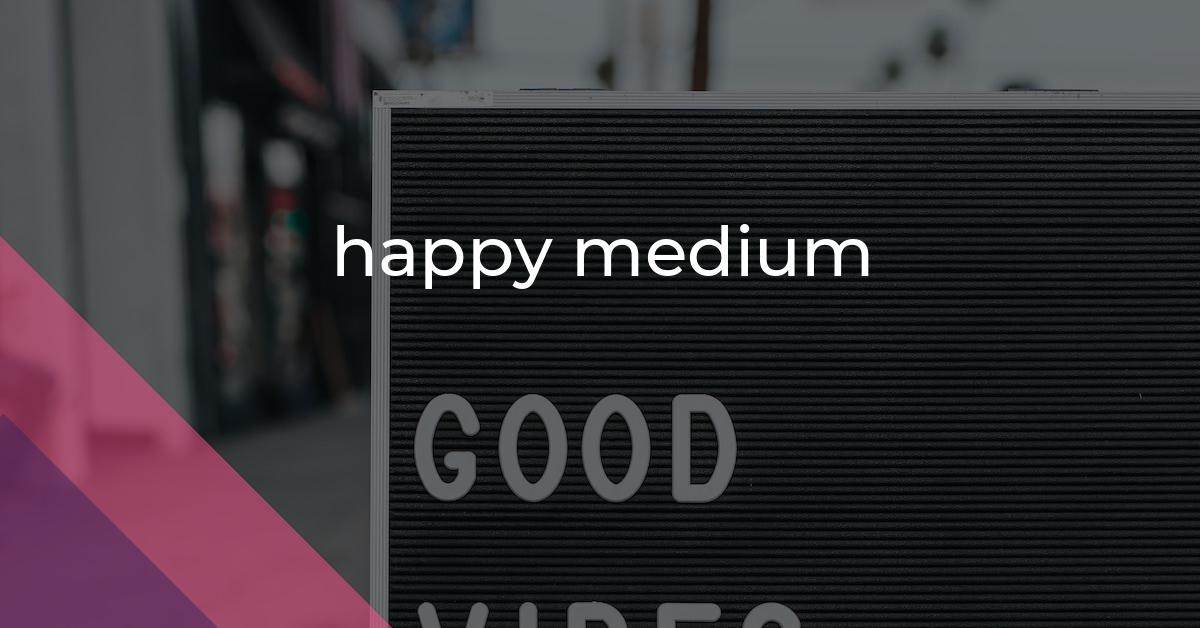happy medium: Idiom Meaning and Origin
What does ‘happy medium’ mean?
The idiom "happy medium" refers to finding a balance or compromise between two extremes or conflicting ideas.

Idiom Explorer
The idiom "middle ground" refers to a position or solution that is a compromise between two extreme options or opinions.
The idiom "half murder" is used to describe a situation or task that is incredibly difficult or challenging. It conveys the idea of something being almost as difficult as committing murder, suggesting a high level of effort or intensity.
The idiom "half joke" refers to a statement or remark that is meant to be humorous, but also contains a serious or true element. It is a way of expressing a thought or opinion in a lighthearted manner while acknowledging some underlying truth or seriousness.
The idiom "grey area" refers to a situation or issue that is unclear, vague, or not easily categorized as right or wrong.
The idiom "go halves" means to share the cost or responsibility of something equally with someone else.
The idiom "go halfsies" means to split the cost or share something equally between two people.
The idiom *glass-half-full* refers to having an optimistic outlook on life or a positive attitude, focusing on the positive aspects of a situation rather than the negatives.
The idiom "give and take" means to compromise or negotiate with others, by both parties making concessions and understanding each other's needs.
The idiom "fall between two stools" means to fail or be unsuccessful because of indecision or inaction.
Finding Balance
The idiom "happy medium" refers to finding a satisfactory compromise between two extremes. It suggests achieving a balance or moderation in a given situation. The phrase dates back to the late 18th century, but its usage remains prevalent in modern English.
In terms of etymology, "happy" conveys contentment or satisfaction, while "medium" refers to a middle point or position. Together, they form the idiom "happy medium," which encapsulates the idea of a harmonious equilibrium.
The idiom is widely used across various contexts, ranging from personal relationships to business negotiations. It often implies the need to avoid extremes or excesses, allowing for a more practical and reasonable approach.
One example of the idiom's usage can be seen in trying to strike a balance between indulging in delicious food and maintaining a healthy diet. In this case, finding the happy medium would involve enjoying tasty meals in moderation, rather than completely depriving oneself or overindulging.
Another example applies to the management of resources in a company. Striving for a happy medium may involve allocating funds and personnel in a way that avoids excessive or insufficient dedication to different projects or departments.
A key component of the idiom is the notion of compromise. It suggests that while individuals may have differing preferences or needs, a happy medium can be reached through mutual understanding and concessions.
It is important to note that the happy medium may vary depending on specific circumstances and individuals involved. What may be considered a balanced compromise in one situation could be perceived as too extreme in another. Therefore, achieving a happy medium requires a thorough understanding of the context and the ability to adapt accordingly.
The idiom "happy medium" reflects the human desire for balance and compromise. It encourages individuals to find a satisfactory middle ground between extremes, promoting moderation and practicality.
The related idiom "middle ground" is closely connected to the concept of a happy medium. It refers to finding a compromise or shared opinion between two opposing viewpoints. In essence, it embodies the idea of meeting halfway, where neither extreme is favored over the other. Finding the middle ground often involves understanding and acknowledging the merits of both sides, and then finding a solution that incorporates elements from both perspectives.
Another related idiom is "fair to middling," which shares a similar sentiment with the happy medium. "Fair to middling" describes something that is average or moderate in quality. It is not exceptional, but it is also not poor. This idiom conveys the idea of being satisfactory or adequate, without being outstanding. In this context, achieving a happy medium would mean finding a balance where neither excellence nor mediocrity dominates.
"halfway decent" is another idiom that resonates with the concept of a happy medium. It suggests something that is reasonably satisfactory or acceptable, without necessarily being exceptional. In this idiom, the notion of being halfway describes a moderate level of quality or performance. Finding a happy medium would involve striking a balance where neither poor nor excellent outcomes prevail.
The idiom "best of both worlds" can also be linked to the notion of a happy medium. It refers to a situation where one can enjoy the advantages or benefits of two different options simultaneously. It implies finding a solution or approach that combines the positive aspects of two seemingly conflicting choices. This idiom aligns with the idea of achieving a happy medium by maximizing the advantages of both extremes.
Striving for a happy medium can lead to greater contentment and harmonious outcomes. While the idiom suggests a resolution, it also leaves room for ongoing exploration and possibilities in the quest for balance.
Example usage
Examples of how the idiom happy medium can be used in a sentence:
1. After discussing their preferences for outdoor activities, they decided that going for a walk in the park would be a happy medium between hiking and staying at home.
2. Jane wanted to redecorate her living room, but she didn't want it to be too fanciful or too plain. She aimed to find a happy medium by choosing a modern and elegant design.
3. When it came to portion sizes, the chef found it challenging to strike a happy medium between serving enough food to satisfy customers and avoiding excessive waste.
More "Balance" idioms



